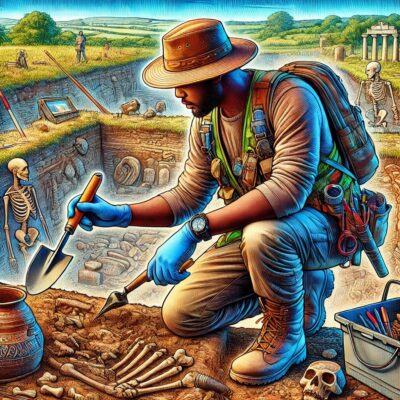Archaeologists study past human civilizations by excavating, analyzing, and interpreting artifacts, structures, and cultural remains. They contribute to understanding historical development and preserving cultural heritage.
What is a typical day as an Archaeologist?
– Conducting fieldwork, such as excavations, surveys, or site mapping
– Analyzing artifacts, fossils, or structures in laboratories or research facilities
– Writing reports, articles, or books to document and share findings
– Collaborating with museums, universities, or cultural heritage organizations.
What else might they be expected to do?
– Teach archaeology or related subjects at universities or workshops
– Consult on preservation projects for historical sites
– Assist governments or NGOs in cultural resource management
What type of training is needed for this career path?
– A Bachelor’s degree in Archaeology, Anthropology, or History is the starting point.
– A Master’s or Ph.D. in Archaeology is essential for advanced research or academic roles.
– Field experience through internships or volunteer opportunities is crucial.
What kind of personality is needed to excel in this career path?
– Curious, detail-oriented, and methodical individuals excel in this role.
– Big 5 traits: Openness and Conscientiousness.
– Myers-Briggs types: INTJ or ISTP often align with this career.
What kind of interests do people in this career path have?
– Passion for history, discovery, and cultural preservation (Investigative and Artistic traits).
– Interest in fieldwork, research, and storytelling.
– Interests & Aptitude: Investigative (I), Realistic (R), and Artistic (A)
Are there any innate skills or aptitudes required?
– Strong analytical and critical-thinking skills for interpreting findings
– Physical stamina and dexterity for fieldwork in varied conditions
– Communication skills to share findings with academic and public audiences
What challenges can I expect to face if I pursue this career path?
– Navigating funding challenges for fieldwork and research projects
– Working in remote or physically demanding environments
– Balancing cultural sensitivities with the scientific study of remains
What are the job prospects for this path in Kenya and Africa? What about International prospects for a Kenyan citizen?
– Kenya and Africa: Significant opportunities exist in cultural heritage preservation, museums, and tourism. Kenya’s rich archaeological sites, like those in Turkana or Olduvai Gorge, provide unique opportunities.
– International: Archaeologists are sought globally for research, cultural resource management, and academic roles. Kenyan archaeologists with expertise in African heritage can access international projects and collaborations.
What should I focus on if I choose to pursue this career?
– Gain field experience through excavations or internships.
– Build expertise in specific areas, such as paleoanthropology or historical archaeology.
– Network with academic institutions, museums, and cultural heritage organizations.
Which other careers or job roles can I progress to?
– Cultural Heritage Manager
– Museum Curator
– Academic Lecturer or Researcher
– Policy Advisor in Cultural Preservation
– Historical Consultant for Media or Projects

